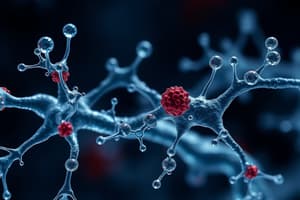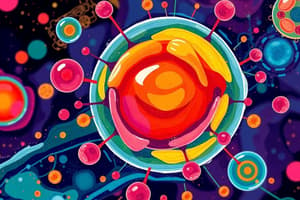Podcast
Questions and Answers
What are atoms?
What are atoms?
Basic units of matter, consisting of protons, neutrons, and electrons.
Define molecules.
Define molecules.
Formed when two or more atoms bond together.
What is an element?
What is an element?
Pure substances made of only one type of atom.
What is a compound?
What is a compound?
What type of bond involves the transfer of electrons between atoms?
What type of bond involves the transfer of electrons between atoms?
What does the pH scale measure?
What does the pH scale measure?
What is the basic unit of life according to cell theory?
What is the basic unit of life according to cell theory?
What is DNA?
What is DNA?
Evolution is the process by which species remain unchanged over time.
Evolution is the process by which species remain unchanged over time.
What major systems are included in human biology?
What major systems are included in human biology?
Name the layers of Earth's structure.
Name the layers of Earth's structure.
What causes earthquakes and volcanic activity?
What causes earthquakes and volcanic activity?
What is the difference between weather and climate?
What is the difference between weather and climate?
What is the rock cycle?
What is the rock cycle?
Define biodiversity.
Define biodiversity.
What do Newton's Laws of Motion describe?
What do Newton's Laws of Motion describe?
Match the types of energy with their definitions:
Match the types of energy with their definitions:
What does the Law of Conservation of Energy state?
What does the Law of Conservation of Energy state?
Sound waves are classified as longitudinal waves.
Sound waves are classified as longitudinal waves.
What is electric current?
What is electric current?
What are the steps of the scientific method?
What are the steps of the scientific method?
What is an independent variable?
What is an independent variable?
Define reproducibility in scientific experiments.
Define reproducibility in scientific experiments.
Study Notes
Basic Chemistry Concepts
- Atoms and Molecules:
- Atoms: Basic units of matter, consisting of protons, neutrons, and electrons.
- Molecules: Formed when two or more atoms bond together.
- Elements and Compounds:
- Elements: Pure substances made of only one type of atom (e.g., oxygen, gold).
- Compounds: Substances made of two or more different types of atoms (e.g., water = H2O).
- Chemical Bonds:
- Ionic Bonds: Transfer of electrons between atoms, resulting in charged ions.
- Covalent Bonds: Sharing of electrons between atoms.
- pH Scale: Measures acidity (0-7) to alkalinity (7-14); 7 is neutral.
- States of Matter: Solid, liquid, gas, and plasma; dependent on temperature and pressure.
Life Sciences Overview
- Cell Theory:
- All living organisms are composed of cells.
- Basic unit of life is the cell.
- All cells arise from pre-existing cells.
- Genetics:
- Study of heredity and variation in organisms.
- DNA: Genetic material that carries information.
- Evolution:
- Process by which species change over time through natural selection.
- Ecosystems:
- Interactions between living organisms and their environment.
- Energy flow and nutrient cycling are key concepts.
- Human Biology:
- Major systems include circulatory, respiratory, digestive, and nervous systems.
Earth And Space Science Fundamentals
- Earth's Structure:
- Composed of crust, mantle, outer core, and inner core.
- Tectonic plates cause earthquakes and volcanic activity.
- Weather and Climate:
- Weather: Atmospheric conditions over short periods.
- Climate: Long-term weather patterns in a region.
- Solar System:
- Composed of the Sun, planets, moons, asteroids, and comets.
- Earth orbits the Sun; gravity governs planetary motion.
- Rock Cycle:
- Continuous process of rock formation and transformation: igneous, sedimentary, and metamorphic rocks.
- Biodiversity:
- Variety of life forms on Earth; essential for ecosystem balance.
Physical Science Principles
- Forces and Motion:
- Newton's Laws of Motion describe the relationship between forces and motion.
- Types of forces: gravitational, frictional, tension, and normal forces.
- Energy:
- Ability to do work; types include kinetic, potential, thermal, and chemical energy.
- Law of Conservation of Energy: Energy cannot be created or destroyed.
- Matter and Its Properties:
- Physical properties: color, density, melting point.
- Chemical properties: flammability, reactivity.
- Waves and Sound:
- Waves transfer energy through matter (mechanical) or vacuum (electromagnetic).
- Sound waves are longitudinal waves that require a medium.
- Electricity and Magnetism:
- Electric current: flow of electric charge; measured in amperes.
- Magnetism: force produced by moving electric charges.
Scientific Method And Experimentation
- Steps of the Scientific Method:
- Observation: Identify a problem or question.
- Hypothesis: Formulate a testable prediction.
- Experimentation: Design and conduct experiments to test the hypothesis.
- Data Collection: Gather and analyze results from experiments.
- Conclusion: Draw conclusions based on the data; support or reject the hypothesis.
- Communication: Share results with the scientific community.
- Variables in Experiments:
- Independent variable: manipulated by the researcher.
- Dependent variable: measured outcome affected by the independent variable.
- Control group: baseline for comparison; not exposed to the treatment.
- Reproducibility: Essential for validation of scientific findings; experiments should yield consistent results when repeated.
Basic Chemistry Concepts
- Atoms: Fundamental units of matter; composed of protons (positively charged), neutrons (neutral), and electrons (negatively charged).
- Molecules: Created when two or more atoms bond; can consist of the same or different types of atoms.
- Elements: Pure substances made from one type of atom, such as oxygen (O) and gold (Au).
- Compounds: Substances containing two or more different types of atoms, e.g., water (H2O) consists of hydrogen and oxygen atoms.
- Chemical Bonds:
- Ionic Bonds: Involve the transfer of electrons, resulting in charged ions.
- Covalent Bonds: Involve the sharing of electrons between atoms.
- pH Scale: Ranges from 0-14; measures acidity (0-7), alkalinity (7-14), with 7 indicating neutrality.
- States of Matter: Includes solid, liquid, gas, and plasma; physical state determined by temperature and pressure.
Life Sciences Overview
- Cell Theory: Fundamental principle that all living beings consist of cells, which are the basic units of life that arise from pre-existing cells.
- Genetics: The field focusing on heredity and genetic variation; DNA serves as the genetic blueprint carrying information.
- Evolution: Describes how species evolve over time through natural selection, adapting to their environments.
- Ecosystems: Comprised of interactions among organisms and their surroundings; emphasizes energy flow and nutrient cycling.
- Human Biology: Encompasses various body systems including circulatory, respiratory, digestive, and nervous systems vital for proper functioning.
Earth And Space Science Fundamentals
- Earth's Structure: Divided into crust, mantle, outer core, and inner core; tectonic plate movements lead to seismic and volcanic activity.
- Weather vs. Climate: Weather involves short-term atmospheric conditions, while climate represents long-term patterns in an area.
- Solar System: Includes the Sun, planets, moons, asteroids, and comets; planetary motion is governed by gravitational forces.
- Rock Cycle: Ongoing process involving the formation and transformation of rocks: igneous, sedimentary, and metamorphic types.
- Biodiversity: Refers to the variety of life forms and their interdependence, crucial for ecosystem stability and health.
Physical Science Principles
- Forces and Motion: Governed by Newton's Laws, which elucidate the interplay between forces and motion; forces include gravitational, frictional, and tension forces.
- Energy: Defined as the capacity to perform work; categorized into kinetic, potential, thermal, and chemical forms.
- Law of Conservation of Energy: Energy cannot be created or destroyed but can only change forms.
- Matter:
- Physical Properties: Characteristics can be observed without changing the substance, e.g., color and density.
- Chemical Properties: Describe how a substance reacts chemically, such as flammability and reactivity.
- Waves and Sound: Waves are energy transmitters; sound waves are mechanical and require a medium for propagation.
- Electricity and Magnetism: Electric current is the flow of charged particles, measured in amperes; magnetism arises from the movement of electric charges.
Scientific Method And Experimentation
- Steps of the Scientific Method:
- Observation of a problem or question leads to hypothesis formation, experimentation, data collection, drawing conclusions, and communication of findings.
- Variables:
- Independent Variable: The factor manipulated by the researcher.
- Dependent Variable: The effect observed and measured in response to changes in the independent variable.
- Control Group: Functions as a baseline, not exposed to the tested treatment, allowing comparison.
- Reproducibility: Fundamental for scientific validation; findings must be consistent when experiments are replicated.
Studying That Suits You
Use AI to generate personalized quizzes and flashcards to suit your learning preferences.
Description
This quiz covers foundational concepts in chemistry and life sciences, including atoms, molecules, and the importance of cell theory. Understand the differences between elements and compounds, chemical bonds, and states of matter, alongside an introduction to genetics. Perfect for students looking to solidify their understanding of basic scientific principles.




